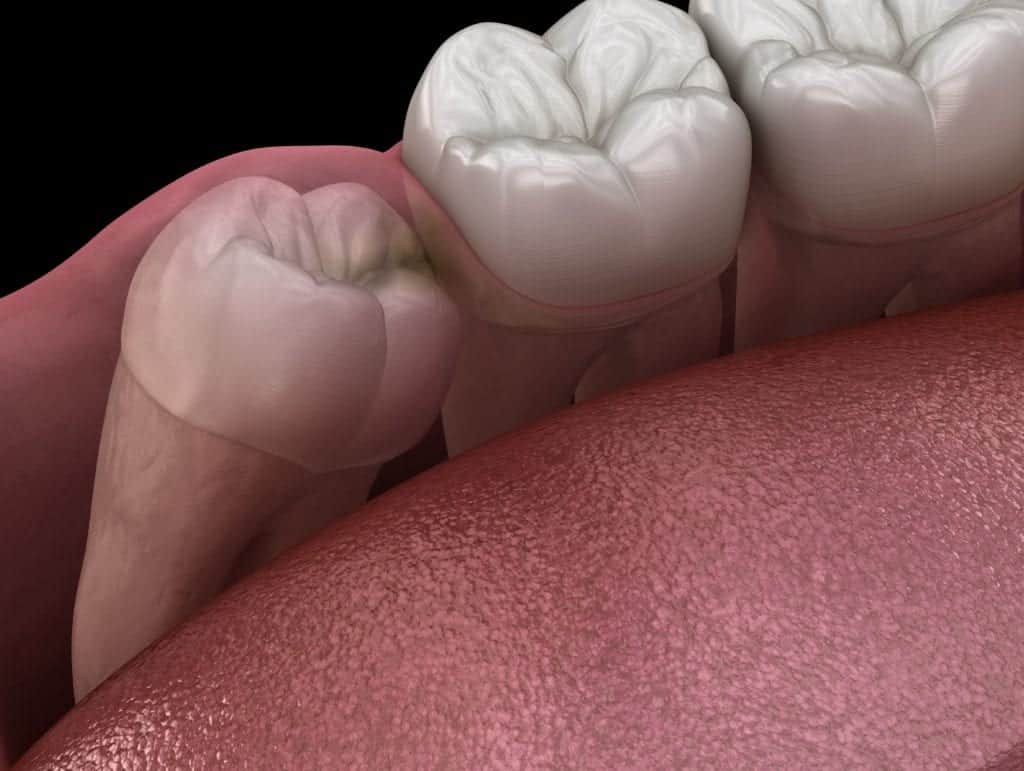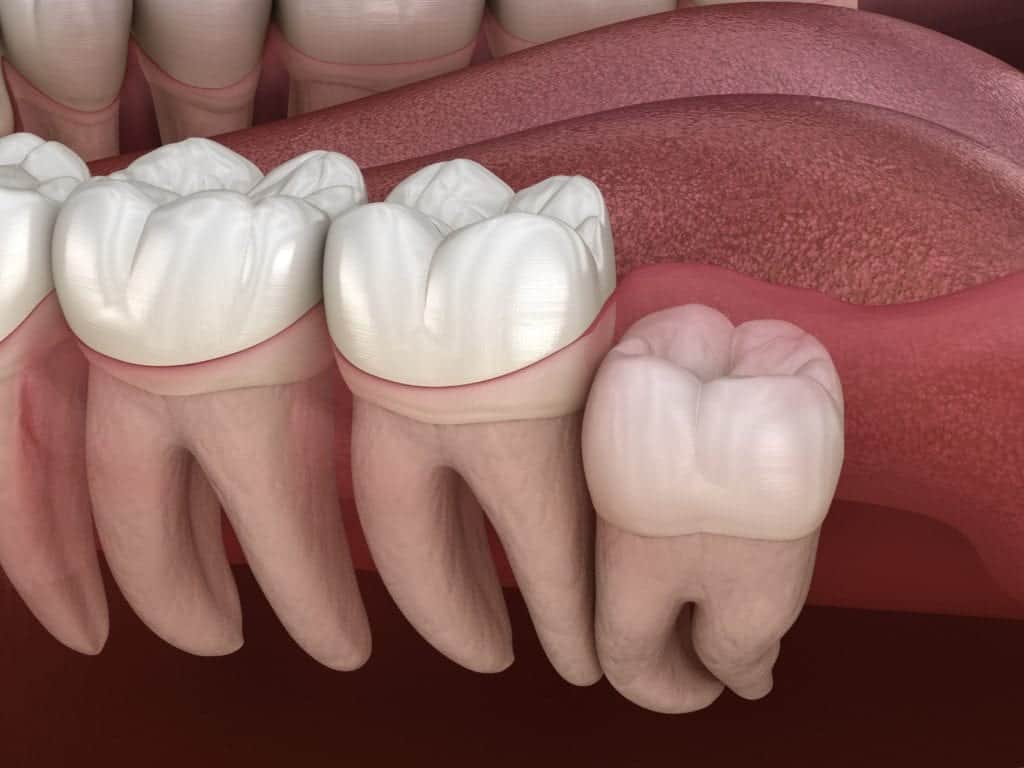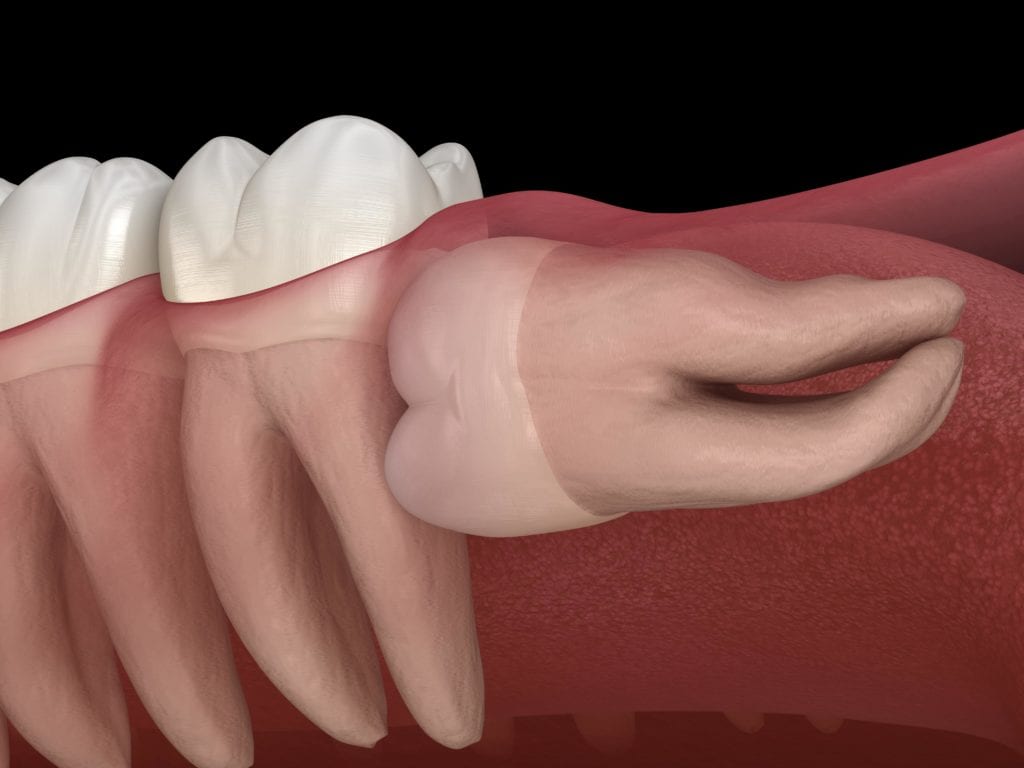Although wisdom teeth, or the third set of molars, were once essential for grinding down food from our ancestral diets, they no longer serve a purpose. Unfortunately wisdom teeth often cause problems such as pain, swelling, infection, overcrowding, and damage to the surrounding teeth. This is because the human jaw has evolved to be smaller than it was in the past, causing many wisdom teeth to become impacted.
Impaction is a dental term used to describe a tooth that is unable to erupt properly. Impaction can occur as a full impaction or a partial impaction. Fully impacted wisdom teeth reside completely underneath the gum tissue and are unable to break through. Partially erupted wisdom teeth are those that have partially broke through the gum tissue, but are still partially underneath the gum tissue. To determine if you have an impacted wisdom tooth, see “3 Signs of Impacted Wisdom Teeth”.
In dental terms, there are four types of wisdom teeth impactions, including:


Mesial Impactions:
Mesial impactions are the most commonly occurring type of wisdom teeth impaction. With a mesial impaction, the tooth is partially erupted and angled towards the front of the mouth. For this reason, mesial impactions are sometimes referred to as “angular impactions”. This type of impaction may or may not cause issues and is usually closely monitored before making decisions on whether or not to remove the tooth.


Vertical Impactions:
Vertical impactions are a type of full impaction where the tooth is in the correct position for eruption, but still lies below the gums. Since wisdom teeth with vertical impactions are in the correct position, extraction is rarely needed unless the erupted tooth is expected to cause overcrowding or if it is exerting too much pressure on the tooth root next to it.


Horizontal Impactions:
Horizontal impactions are a type of full impaction where the tooth is lying completely horizontally underneath the gums. Instead of moving up through the gums, the horizontal orientation of the tooth causes it to move sideways into the tooth next to it. For this reason, horizontal impactions are considered to be the most painful type of wisdom tooth impaction. To alleviate pain and prevent damage to the adjacent teeth, wisdom teeth that are horizontally impacted must be removed with a surgical extraction.

Distal Impactions:
Distal impactions are the most rare of all types of wisdom teeth impactions. Like teeth with a mesial impaction, teeth with a distal impaction are angled and can sometimes be called “angular impactions”. However unlike a mesial impaction, teeth with a distal impaction are angled towards the back of the mouth and may be partially or fully impacted. The need for extraction will depend upon the degree of the tooth angle, as well as whether the tooth is partially or fully impacted.
Mesial, vertical, horizontal, and distal impactions are the four types of wisdom teeth impactions. All four types of wisdom teeth impactions can be treated by extracting the affected tooth in order to relieve symptoms and preserve oral health. However, there are some cases where certain types of impactions, such as vertical and distal, may not need to be extracted. Ultimately, only a dentist experienced with wisdom teeth extractions can determine what type of impaction is present and what the best course of action is.

Dr. Dennis Laurich has been practicing dentistry for over 40 years. He received his DDS degree from the University of Michigan Dental School and regularly attends oral health care conventions to continue his dental education. This allows him to treat patients with the leading dental technology and methodologies. Additionally, he is a member of the American Dental Association, Michigan Dental Association, and the Detroit District Dental Society.
Dr. Dale Flanagin II is a distinguished professional in the field of dentistry, holding a Bachelor’s degree in Molecular Biology and Biotechnology as well as a Doctor of Dental Surgery degree. He is committed to improving the lives of others through his work, driven by a lifelong passion for helping people.





